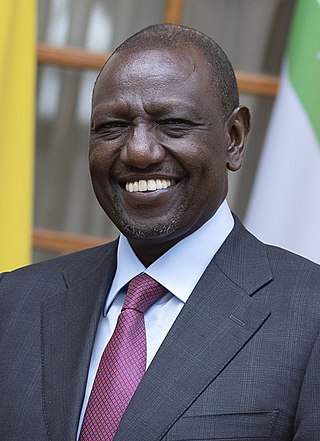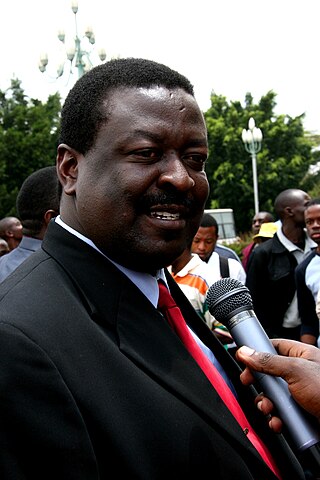This article needs additional citations for verification .(March 2021) |
| Part of the Politics series |
| Direct democracy |
|---|
 |
| |
Referendums in Kenya are polls held in Kenya on particular issues.
This article needs additional citations for verification .(March 2021) |
| Part of the Politics series |
| Direct democracy |
|---|
 |
| |
Referendums in Kenya are polls held in Kenya on particular issues.

The National Rainbow Coalition (NARC) is a political party in Kenya. As an alliance, it was in power from 2002 and 2005 when it collapsed due to disagreements between members over a constitutional referendum.

Kenya, officially the Republic of Kenya, is a country in East Africa. A member of the Commonwealth with a population of more than 47.6 million in the 2019 census, Kenya is the 28th most populous country in the world and 7th most populous in Africa. Kenya's capital and largest city is Nairobi, while its oldest and second largest city, which until 1907 was also Kenya's first capital city, is the coastal city of Mombasa which includes Mombasa Island in the Indian Ocean and the surrounding mainland. Kisumu is the third-largest city and also an inland port in the Winam Gulf which, along with its numerous bays and human settlements, is one of the important maritime transport, fishing, farming, commercial, history and tourism hubs on Lake Victoria. As of 2020, Kenya is the third-largest economy in sub-Saharan Africa after Nigeria and South Africa and hosts the United Nations, UNEP and UN-HABITAT headquarters in Africa. Kenya is bordered by South Sudan to the northwest, Ethiopia to the north, Somalia to the east, Uganda to the west, Tanzania to the south, and the Indian Ocean to the southeast and is host to two of the world's largest Refugee camps at Dadaab and Kakuma. Kenya's geography, climate and population vary widely, ranging from cold snow-capped mountaintops with vast surrounding forests, wildlife and fertile agricultural regions to temperate climates in western and rift valley counties and further on to dry less fertile arid and semi-arid areas and absolute deserts.

Uhuru Muigai Kenyatta is a Kenyan politician who served as the fourth president of Kenya from 2013 to 2022.

Uhuru Park is a 12.9 hectare recreational park adjacent to the central business district of Nairobi, Kenya. It was opened to the general public by the late Mzee Jomo Kenyatta on 23 May 1969. It contains an artificial lake, several national monuments, and an assembly ground which has become a popular skateboarding spot on weekends and also a location for local skateboarding competitions, catering to Nairobi's growing skate scene.

Elections in Kenya take place within the framework of a multi-party democracy and a presidential system. The President, Senate and National Assembly are directly elected by voters, with elections organised by the Independent Electoral and Boundaries Commission (IEBC).

Moyale is a city on the border between Ethiopia and Kenya. In Ethiopia, Moyale is the administrative centre for two Ethiopian woredas, Moyale of Oromia Region and Moyale of Somali Region. In Kenya, it is the largest town of Marsabit County and the capital of Moyale sub-county.

William Kipchirchir Samoei arap Ruto is a Kenyan politician who has served as the fifth president of Kenya since 13 September 2022. Prior to becoming president, he served as the first elected deputy president of Kenya from 2013 to 2022. Previously, holders of the position were referred to as Vice President and the officeholder was unelected and appointed by the President. He previously served in three cabinet portfolios as the Minister for Home Affairs, the Minister of Agriculture and as Minister for Higher Education.

Wycliffe Musalia Mudavadi is a Kenyan politician and land economist who is currently serving as Prime Cabinet Secretary of Kenya and expanded role of Foreign & Diaspora Affairs Minister of Kenya, he is also the party leader of the Amani National Congress (ANC), one of the founding political parties, of the Kenya Kwanza alliance. He served as the 7th Vice-President of Kenya in 2002 and Deputy Prime Minister (2008–2012), when he resigned to contest for the Presidency in the 2013 Kenyan general election and emerged third. He was the deputy party leader of the Orange Democratic Movement (ODM) (2005–2012) and Party Leader of the United Democratic Forum Party (UDF) from May 2012 to July 2015.

A constitutional referendum was held in Kenya on 21 November 2005. Although many government officials, including President Mwai Kibaki, had campaigned for a "yes" vote, the proposed new constitution was rejected by 58% of voters.

The prime minister of Kenya was a post in the Kenyan government. The first prime minister of Kenya was Jomo Kenyatta, who became prime minister in 1963. In 1964, Kenya became a republic, the post of prime minister was abolished and Jomo Kenyatta became president. Following a power-sharing agreement in February 2008, the role was recreated that April and held by Raila Odinga. The position was again abolished by the 2010 Constitution after the 2013 elections.
The Orange Democratic Movement (ODM) is a centre-left political party in Kenya. It is the successor of a grassroots people's movement which was formed during the 2005 Kenyan constitutional referendum campaign. This movement separated in August 2007 into the Orange Democratic Movement Party of Kenya and the Wiper Democratic Movement – Kenya.

The Comprehensive Peace Agreement, also known as the Naivasha Agreement, was an accord signed on 9 January 2005, by the Sudan People's Liberation Movement (SPLM) and the Government of Sudan. The CPA was meant to end the Second Sudanese Civil War, develop democratic governance countrywide, and share oil revenues. It also set a timetable for a Southern Sudanese independence referendum.
Narok North is an electoral constituency in Kenya. It is one of six constituencies of Narok County. The constituency was established for the 1969 elections. Its current Member of Parliament is Hon. Agnes Mantaine Pareyio who also happens to be the first Woman to occupy the much coveted seat.

A constitutional referendum was held in Kenya on 4 August 2010. Voters were asked whether they approved of a proposed new constitution, which had been passed by the National Assembly on 1 April 2010. The new constitution was seen as a vital step to avoid a repetition of the violent outbursts after the 2007 general elections.

Kadhi courts or Kadhi's courts are a court system in Kenya that enforce limited rights of inheritance, family, and succession for Muslims. The history of Kadhi courts extends prior to the colonization of East Africa in the 19th century, and the courts continued under British rule and after Kenyan independence in 1963. An estimated 7% to 20% of the population of Kenya is Muslim.

The Senate of the Republic of Kenya is one of the two Houses of the Parliament of Kenya, along with the National Assembly. The Senate was first established as part of Kenya's 1963 Constitution.

The Constitution of Kenya is the supreme law of the Republic of Kenya. There have been three significant versions of the constitution, with the most recent redraft being enabled in 2010. The constitution was presented to the Attorney General of Kenya on 7 April 2010, officially published on 6 May 2010, and was subjected to a referendum on 4 August 2010. The new Constitution was approved by 67% of Kenyan voters. The constitution was promulgated on 27 August 2010.

The geography of South Sudan describes the physical features of South Sudan, a country in East Africa. South Sudan is a landlocked country and borders – clockwise – Sudan from the north, Ethiopia from the east, Kenya, Uganda and the Democratic Republic of the Congo from the south and the Central African Republic from the west.

The Independent Electoral and Boundaries Commission (IEBC) is an independent regulatory agency that was founded in the year 2011 through the making of the Constitution of Kenya. The Commission is responsible for conducting or supervising referendums and elections to any elective body or office established by the Constitution, and any other elections as prescribed by an Act of Parliament. It was created in a provision of the 2010 constitution and the Independent Electoral and Boundaries Commission Act. Its mandate includes "the continuous registration of voters and revision of the voter's roll, the delimitation of constituencies and wards, the regulation of political parties process, the settlement of electoral disputes, the registration of candidates for elections, voter education, the facilitation of the observation, monitoring and evaluation of elections, the regulation of money spent by a candidate or party in respect of any election, the development of a code of conduct for candidates and parties, [and] the monitoring of compliance with legislation on nomination of candidates by parties."

The Building Bridges Initiative (BBI) was a proposed set of amendments to the Constitution of Kenya initially proposed in October 2019. In the wake of the 2017 general election annulment and subsequent re-run, incumbent President Uhuru Kenyatta mandated the formation of the Presidential Taskforce on Building Bridges to Unity Advisory on 31 May 2018. The Taskforce was assigned to provide constitutional and legislative solutions in 9 broad categories: